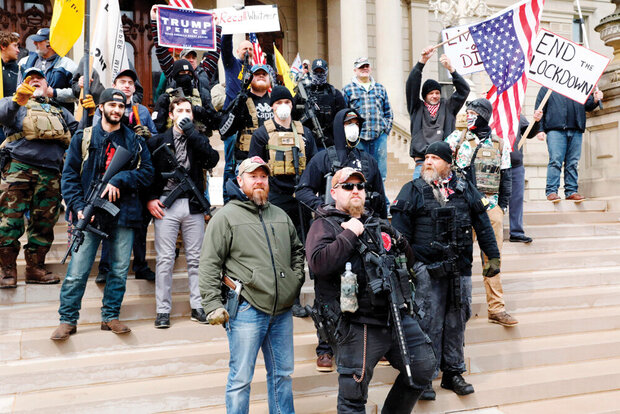The novel coronavirus spread rapidly across the Far East, West Asia, and Europe and finally hit the United States very hard. The largest world economies, which once could experience a horrible nightmare for only a short time lockdown, have now faced over a month of closure due to the spread of the virus.
The virus has impacted the entire human life in the world. The influences have been more obvious and devastating in the countries whose lifestyle had been formed based on profit-based mercantilism policy.
Mercantilism is an economic theory that trade generates wealth and is stimulated by the accumulation of profitable balances, which a government should encourage by means of protectionism.
It should not be ignored that the coronavirus first emerged in a country which enjoyed the largest economic growth in the world. But later it mainly influenced the most powerful economic power in the world, the United States. The impacts of the virus on the U.S. have been awful.
The United States of America which is considered as the largest economy in the world; the General Motors Company whose wealth has been estimated as equal as a wealthy West European country similar to the Netherlands; and the New York City, as the richest metropolis worldwide, whose wealth is equal to Canada's wealth, have all faced devastating challenges in various political, economic and social fields due.
General Motors Company, commonly referred to as General Motors (GM), is an American multinational corporation headquartered in Detroit that designs, manufactures, markets, and distributes vehicles and vehicle parts, and sells financial services, with global headquarters in Detroit's Renaissance Center. It was originally founded by William C. Durant on September 16, 1908, as a holding company. The company is the largest American automobile manufacturer, and one of the world's largest ones. As of 2019, General Motors is ranked #13 on the Fortune 500 rankings of the largest United States corporations by total revenue.
Perhaps, none of the American residents have experienced such hard days in their life. Those busy streets in large cities are now mired in a very deep panic. The panic, resulting from the outbreak, has had negative impacts on the U.S. citizens' social relations. Nowadays, the U.S. citizens are witnessing the challenges of major decisions made by the federal government or individual states.
The American citizens are caught in contradictory decisions made by officials at federal or state level. Such decisions pose one of the most important challenges threatening the U.S. regarding social relations and political power-sharing.
When the new lands in the northern part of the American continent were discovered, the then politicians decided to form a Confederation of States to have a say in global policies. At that time, the mentioned politicians could not even imagine that once their United States would face such a horrible internal challenge.
The United States' economy cannot tolerate any halt. Its economy is merely founded on gaining more and more profits, with a preference on citizens' soul and life. From the point of view of pro-profit people, the issue that has granted honor to the Americans is the country's economic strength, not the country's people. Therefore, in a conflict between the United States' economy and the societies' health, the economy must survive by victimizing citizens.
President Donald Trump, as the chief of the federal government, ordered reopening of the economy in all 50 states across the United States but the governors opposed his decision. It was the challenge that had not been predicted by the politicians when the confederation was established. In such situations, the pro-profit citizens have no choice to protect themselves but purchasing and using a gun.
From economic and moral point of view, the United States is passing its hardest days. Citizens are not only struggling with each other while shopping necessary goods but also they have to fight against the rulers and managers to run a country's economy whose pillars are ordinary people.
Such dangerous conflicts can go beyond a state. Certainly, pro-federal government protests in some states, using weapons to end virus restrictions, is a flash decision, but after the coronavirus crisis is over the United States will enter a post-coronavirus era with huge challenges. The mentioned short-run and long-run issues will surely have unprecedented impacts on the country's political scene too.
The current situation in a short period of time will influence the November presidential election. Trump has promised that if his administration overcomes the virus outbreak with less than 100,000 death toll his government has accomplished the mission with a good record which will strengthen his standing in the upcoming election. But the voters know well that such claims and predictions have their roots in Trump's pride that he has received by inheritance from his British mother and his racist approach from his German father. Trump should find another way to collect votes otherwise he will be the first U.S. president following George H. W. Bush that may fail to remain in the White House for four more years as the president.
However, in the long-run, the current crisis will influence deeply the U.S. society. If the White House officials fail to handle the current crisis well and in time, a question will arise in the minds of the Americans which is, "should the Americans continue caring this inefficient federalism?"
Ultimately, the largest economy in the world will certainly face a huge challenge, which may direct the United States towards utilizing its first defense equipment but this time in a well-managed way. This can trigger the collapse of the largest economic system which has been caring the half-dead capitalism for decades.
This article was first published in the Tehran Times
























Your Comment